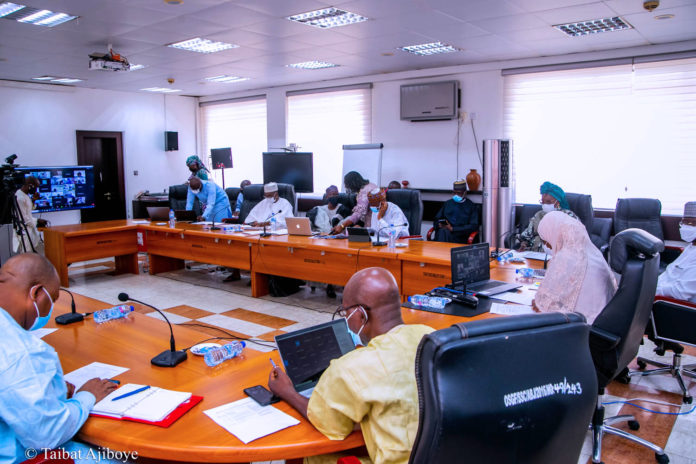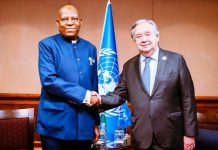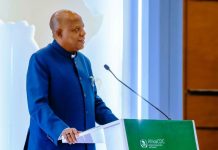The Minister of Humanitarian Affairs, Disaster Management and Social Development Sadiya Umar Farouq has called for a working partnership between state governments and the ministry to stamp out poverty in the country.
The Minister made the call at a virtual extra-ordinary meeting of the Forum of the Secretary to the Government of the Federation and Secretaries to State Governments which was convened on Friday 5th February, 2021, at her instance at the Office of the SGF.
The meeting themed ‘Strengthening National Poverty Eradication Stategies and Policies’ is targeted at effectively coordinating poverty eradication programs in Nigeria using a single document in all the states of the federation.
In her presentation, Umar Farouq emphasized that poverty remains the number one challenge in the country, hence the need to coordinate and synchronize effectively, all programmes aimed at eradicating poverty in Nigeria.
“A careful evaluation of all major programmes and projects of Government since independence on poverty reduction, alleviation and eradication shows that there is a need to harmonise and rationalise intervention strategies and their implementation which will lead to an environment where all programmes are centrally coordinated and monitored with a view to making the overall impacts transparently felt by all Nigerians. Though many actions were taken to address this in the past, the 2018/2019 Poverty and Inequality data in Nigeria, as released by the National Bureau of Statistics shows that the range of poverty headcount is between a high of 87.3% in Sokoto State to a low of 4.5% in Lagos, with a National average of 40.2%.
“This alarming situation and the strategic need to address it is the primary reason why the administration of President Muhammadu Buhari established the Federal Ministry of Humanitarian Affairs, Disaster Management and Social Development to provide National Coordination, strategies and policies for intervention.
“To ensure that these activities are well harmonised, it is imperative to intensify consultations to acquire the desired partnerships and coordination to succeed. This reality and indeed the key stake held by the State Governments in this process is the main reason why I requested the SGF to kindly avail us this platform to consolidate our partnerships and cooperation. Therefore, in order for us to succeed in attaining this vision, securing a partnership between the Ministry and the various State Governments is paramount. This meeting today therefore is the first but significant step in cementing this inter- governmental synergy for the benefit of vulnerable people in our country”.
In his opening remarks, the SGF Mr Boss Mustapha emphasized the need for a well-coordinated National, rather than disparate States and Federal programmes aimed at addressing poverty and called on all the Secretaries to the State Governments to ensure effective machinery for state level coordination and federal level interphase with the Federal Ministry of Humanitarian Affairs, Disaster Management and Social Development.
“The theme of this Forum: Strengthening National Poverty Eradication Strategy is a pointer to the importance of dealing with the unacceptable levels of poverty in Nigeria. This situation is not abating in spite of the various efforts of government at all levels. Ineffective coordination between and within various levels of government have been long implicated as a reason for a not too visible performance. It is therefore, necessary to fill gaps, block leakages, remove overlaps and increase collaboration and partnerships between the Federal and State Governments through the office of SSGs so that we have a real National effort at tackling poverty in the country”.
The Minister of Women Affairs, Dame Pauline Tallen in her goodwill message, called for the full integration of women, Children and youths in poverty reduction programmes and pledged her commitment to support the coordination efforts.
Using the agricultural sector as a key driver of poverty eradication efforts in the country, the Minister of Agriculture and Rural Development Alhaji Mohammed Sabo Nanono solicited a three-tiered collaborative policy implementation through state, multi-MDA and community levels to unlock greater opportunities for agripreneurs across all levels.
One of the major resolutions of the forum is the need for the Ministry of Humanitarian Affairs to anchor collaborative efforts across Federal level Ministries, Extra-Ministerial Departments and Agencies, States and Local Governments, Development Partners, Civil Society Organisations and the Private Sector to harmonise efforts and ensure cost effectiveness and efficiency.
It also called on all Secretaries to the State Governments to strengthen existing coordination mechanisms and where absent, set one up to ensure effective coordination and synchronization at the state level, harmonization and complementarity between and within Ministries and agencies as well as appropriate interphase with the federal government through the Federal Ministry of Humanitarian Affairs, Disaster Management and Social Development.
The meeting had 60 virtual participants including Mr Boss Mustapha, Secretary to the Government of the Federation, Minister of Humanitarian Affairs, Disaster Management and Social Development, Sadiya Umar Farouq, Minister of Agriculture and Rural Development Alhaji Mohammed Sabo Nanono, Minister of Women Affairs, Dame Pauline Tallen, the Statistician General of the Federation, Dr. Yemi Kale, Chairman Dr. Doyin Salami, members of the Presidential Economic Advisory Council (PEAC) as well as Secretaries to State Governments from 22 States and Permanent Secretaries.
NNEKA IKEM ANIBEZE
SA MEDIA
06-02-2021






